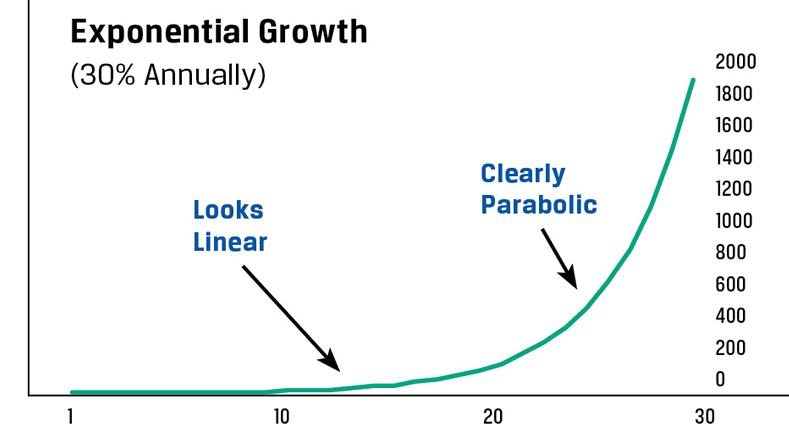While they may make the transition a little faster, the financial realities of renewable electricity and electric vehicles (EVs) mean that government incentives for solar power, batteries, and electric vehicles are not necessary. They are a waste of money at a time when our national budgets (and state, local, business, and personal budgets) are all strained.
EVs are reaching the point where they are cheaper to produce. They cost less to operate. They have almost no maintenance costs other than tires and windshield washer fluid. They cost less to charge. And as renewable electricity capacity continues to grow, will get even cheaper over time.
Renewable energy is already cheaper than fossil fuels. It costs less to install solar or wind power along with associated battery packs than it costs to operate a fossil fuel power plant of comparable size. This trend will continue as more solar panels are made and Wright’s law demonstrates that with each doubling of solar panel manufacturing, has led to a cost decrease of between 30 and 40 percent. This trend shows no sign of decreasing.

Back in 1910, when the automobile was beginning to make an impact on transportation, cities were still overrun with horse drawn transport. There was no national network of gas or service stations. There were few paved roads and no interstate highways. Then Lt Eisenhower was tasked with taking a convoy of trucks and cars across the US, it took him six weeks to make the trip. That experience was one of the things that led to our modern Interstate Highway system, named in his honor. That system did not get started until the 1950s. long after the transition to internal combustion engines was complete.

Despite no national incentives, the transition from animal transport to combustion engine transport took place in less than a decade once it got started. It did so without government tax credits, it did so without government-built gas or service stations. The current cry for government subsidies and tax credits for the transition to EVs and renewable energy are well intentioned but unnecessary. Given the present budget crisis, perhaps it is time for government to allow private enterprise and consumer choices to let the adoption of EVs happen naturally, without government expense that we cannot afford.

Another thing that people do not understand is how fast this transition is going to be. People think linearly, that since there was a growth of 2 percent this year, there will be a growth of 2 percent next year and the transition will take decades. The adoption curve for new technologies tends to be exponential. A one percent growth last year, a two percent growth this year, four the next, and eight after that. Then 16, 32, 64, and basically 100% in less than ten years. EVs basically got started before 2020 and full adoption (except, maybe, for some edge cases and the long tail) will be before 2030. For legacy automotive counting on ICE vehicle sales until 2035 to fund their transition to EVs, this is not good news. For humans who live on earth and breathe the air, it is very good news indeed.


The argument that government incentives for renewable energy and EVs are unnecessary is quite compelling, especially given the financial realities you’ve outlined. It’s fascinating how EVs are becoming more cost-effective to produce and maintain, and how renewable energy is already outcompeting fossil fuels. The comparison to the transition from horse-drawn transport to combustion engines is particularly striking—it shows how market forces can drive change without heavy government intervention. However, do you think the current pace of adoption would be as fast without any incentives at all? While I agree that subsidies can strain budgets, could they still play a role in accelerating the transition in the short term? I’m curious to hear your thoughts on whether there’s a middle ground where incentives are phased out gradually as the market matures. What’s your take on balancing immediate progress with long-term financial sustainability?
It’s fascinating to see how the article compares the shift to electric vehicles and renewable energy with the historical transition from horse-drawn transport to combustion engines. However, isn’t it a bit oversimplified to equate the two scenarios? The article claims that government incentives are unnecessary, but don’t they play a crucial role in accelerating adoption and addressing infrastructure gaps? I’m curious, what’s your take on the idea that EVs and renewables are already financially viable? Sure, costs are decreasing, but aren’t subsidies still useful for ensuring a faster and more equitable transition? Also, the article mentions that the horse-to-engine shift happened without government intervention, but wasn’t that a different era with different technological and societal contexts? Couldn’t today’s challenges—like grid modernization and EV charging networks—benefit from targeted government support? Lastly, do you think the article underestimates the environmental urgency driving the push for renewables and EVs? I’d love to hear your thoughts on this—do you agree that incentives are a waste of money, or is there more to the story?
History does not really repeat, but it does rhyme. The transition to EVs is both different from the switch from horses to ICE and similar. Government incentives for EVs might help to speed the transition, but they are unnecessary as cost continue to decline. But there is a new wrinkle to this. Autonomy. If autonomy had not become an issue, there would eventually have been cheaper and much more affordable EVs. But with autonomy, there is no point in creating a $15K vehicle and adding a $10K software suite. To make the safety benefits of autonomy widely available, car ownership will change. People who would have bought a cheap car will shift towards using robotaxis as these services become ubiquitous and cheap. Financial reality will make this nearly inevitable. As far as grid modernization goes, the addition of utility scale batteries adds an unanticipated amount of resilience to the existing grid and while modernization should happen, batteries will make the transition much smoother and batteries are getting steadily cheaper and better. As far as charging networks go, the majority of EV charging will happen at home. Networks will come into play mostly for road trips and apartment dwellers. Government support will help and could speed up the transition but may not be absolutely necessary. The transition to EVs is already happening far faster than conventional wisdom thought would ever happen. Incentives would make it faster but are not necessary.
Interesting perspective on the financial realities of renewable energy and electric vehicles. While it’s true that EVs and renewables are becoming more cost-effective, I wonder if completely cutting government incentives is the right move, especially during this critical transition period. The comparison to the shift from horses to combustion engines is compelling, but isn’t the scale and urgency of the climate crisis different today? Shouldn’t we accelerate progress rather than wait for market forces alone to drive change? Also, isn’t there a risk that cutting incentives prematurely could slow adoption, especially for lower-income households who might still struggle with upfront costs? What’s your take on balancing fiscal responsibility with the need for rapid decarbonization? And do you think the private sector can fully drive this transition without any government involvement?
Interesting perspective on the transition to renewable energy and electric vehicles. While it’s true that EVs and renewables are becoming more cost-effective, I wonder if government incentives still play a crucial role in accelerating adoption, especially in underserved communities. The comparison to the transition from horse-drawn carriages to combustion engines is thought-provoking, but isn’t the current situation more complex due to climate urgency? Also, isn’t there a risk of leaving certain populations behind without subsidies? What’s your take on balancing market forces with targeted government support? I’d love to hear more about how you see this playing out in the next decade.
Wir haben libersave in unser regionales Gutscheinsystem eingebunden. Es ist toll, wie einfach man verschiedene Anbieter auf einer Plattform bündeln kann.
The argument that government incentives for renewable energy and EVs are unnecessary seems oversimplified. While it’s true that EVs and renewable energy are becoming more cost-effective, incentives can accelerate adoption and help address urgent climate issues. Comparing the transition to combustion engines in the early 20th century ignores today’s need for rapid decarbonization. Shouldn’t we prioritize expediting this shift given the pressing environmental challenges? Also, why dismiss the role of government in fostering innovation and accessibility? Don’t subsidies make these technologies more inclusive for all income levels? Lastly, isn’t it short-sighted to ignore the long-term economic and environmental benefits of such investments?
We’ve integrated libersave into our regional voucher system. It’s fantastic how easily it consolidates various providers on a single platform.